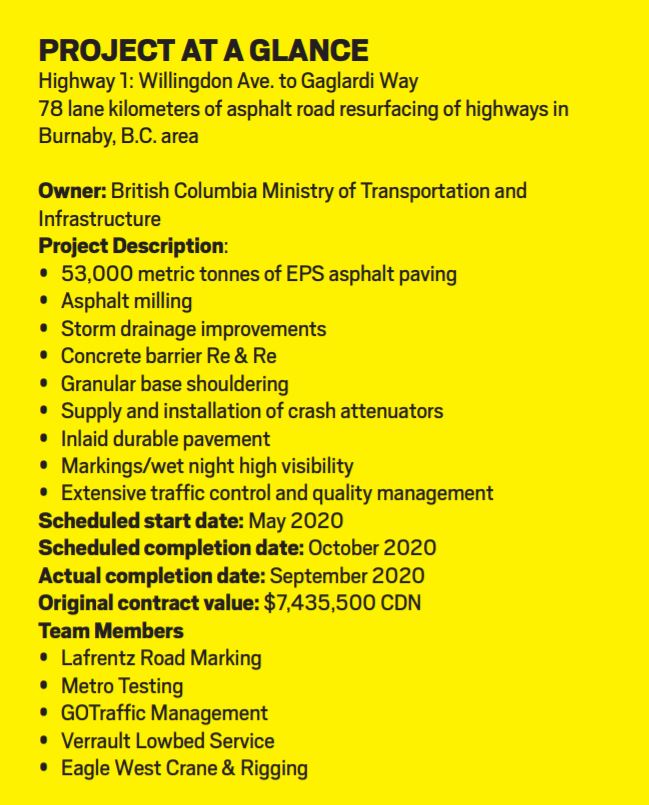Intelligent Compaction Finishes Maintenance Project
BY Janie Gallagher
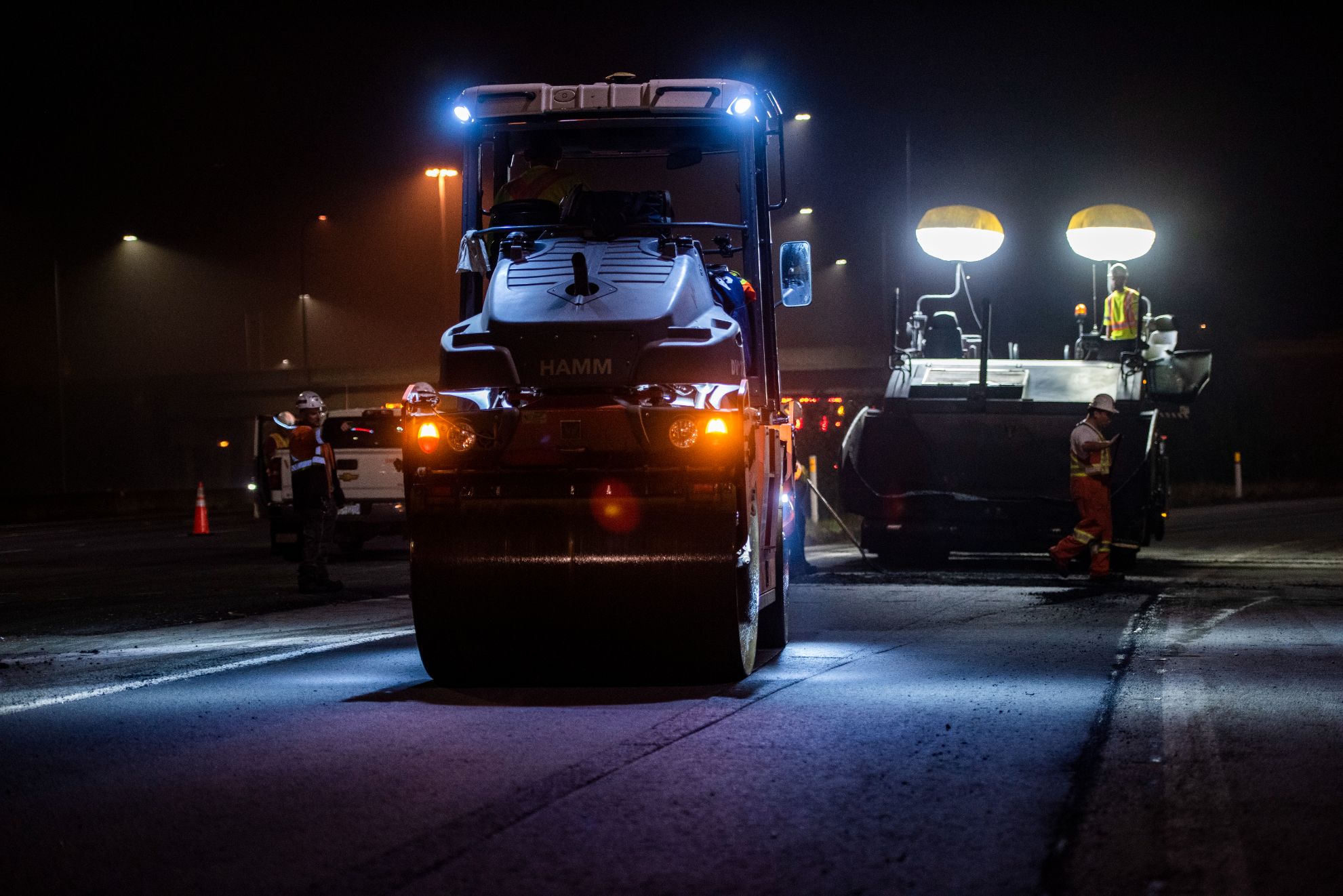
Taking on a high-profile project adds pressure for a contractor. When All Roads Construction Ltd., Surrey, British Columbia, won the British Columbia Ministry of Transportation and Infrastructure’s asphalt road resurfacing contract for Highway 1, the company knew all eyes would be on them. As reported in the November 2020 and January 2021 editions of AsphaltPro magazine, All Roads is no stranger to adopting new technology to accomplish big jobs. Practice on a ½-mile mill-and-overlay job on Airport Road in Chilliwack, British Columbia, and a host of new tech prepped them for the 47-lane-mile job on Canada’s Highway 1.
All Roads won the contract to resurface the stretch of Highway 1 from Willingdon Avenue to Gaglardi Way, which required 53,000 metric tonnes (58,422 tons) of EPS asphalt paving. This portion of the highway is one of the most travelled on roads in British Columbia’s lower mainland. The project came with significant challenges and penalties related to controlling traffic flow and delays.
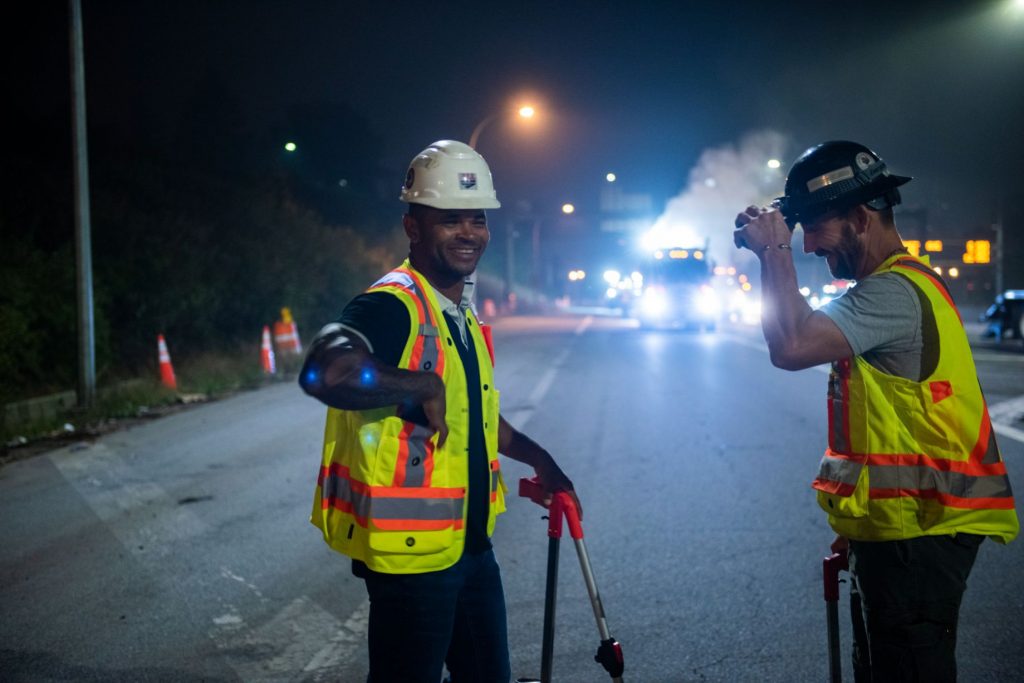
The team worked together to get the work zone set up and taken down quickly, leaving a window of about four or five hours each night for actual mill-and-overlay pavement maintenance work.
“It came with some really stringent criteria and some really big penalties, if you exceeded those timelines,” said Denis Labelle, operations manager for All Roads. “The penalties were $2,500 for the first 15 minutes per lane and then $5,000 for every 15 minutes or portion thereof after.” Counting multiple closed lanes and time, “if you were on the highway an extra hour, it could cost you over $50,000 in unauthorized lane closure fees.”
To avoid getting hit with those penalties, the company ensured they were well organized and equipped with some of the best technologies to tackle a tough project.
“We still managed to put out an average of about 1,700 tonnes [1,874 tons] per shift. We were paving in excess of 350 to 400 tonnes [385 to 440 tons] per hour, which was pretty impressive considering the traditional methods we usually used on the highway,” Labelle said. “I think the technology we got with the Wirtgen equipment—the Vögele paver, the intelligent compaction, the Smooth Ride system we purchased from Topcon—really helped get us to where we needed to be, and get the job done on time and efficiently.”
Max Spedding, superintendent at All Roads, said the tight work windows combined with keeping the traffic flowing presented the biggest challenges to the project.
“We had to remove all the concrete barriers off the highway because we had to pave underneath them, so there was a lot of coordination. There was a lot of complicated sequencing to the project,” Spedding said. “Then, of course, there’s the logistics of being able to set up for your evenings. You’ve got cranes moving barriers, the milling machine out there, you have the pavers out there, sweeper trucks and a bunch of extra work off to the periphery, so there are a lot of moving parts to stay on top of. That, to me, was my biggest challenge—making sure everything was going off without a hitch and the wheels kept spinning all night; because we didn’t have the luxury of having an abundance of time to sit back and not pave to our maximum capabilities. The Wirtgen equipment, just by virtue of their design and the technology they incorporate, was extremely valuable in helping us achieve this project in a timely manner.”
Leaning on technology to enhance efficiencies within the paving operation was vital for the success of the project.
“There was a seven-hour window and three of those hours were dedicated to traffic control,” Labelle explained. “We kind of left our working window to about four or five hours a shift, so it’s not a very big window when you have up to 10 pieces of iron setting up. All the equipment had to be low-bedded into the project and low-bedded out of the project all within that seven to eight-hour window, so it was a coordinating nightmare. To have everything go off without a hitch was an accomplishment on a daily basis. To have all those operators, all those pieces of equipment, and have them all on and off the highway without getting penalties was quite challenging.”
All stakeholders’ eyes were on them constantly due to the resurfacing being the highest profile active project at the time with the highest traffic volumes, but also because of the Wirtgen equipment they used to tackle the job.
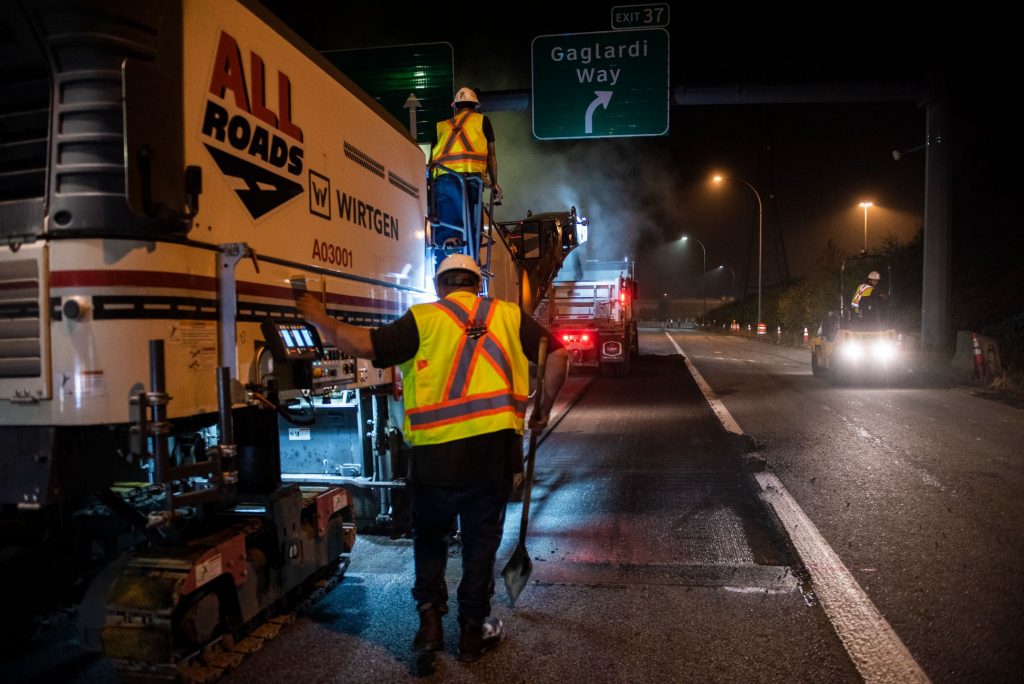
All Roads’ Denis Labelle spoke highly of the W210i milling machine. “This thing is very efficient,” he said. “We’re upgrading that machine to have the same Smooth Ride technology as the Vögele paver, so it’s going to be even more efficient when we set it up with the GPS. It takes all the guess work out of how deep you should be milling. It will grind it out automatically… and that came ready to plug and play from Wirtgen.”
“Because we were using new technologies, they were concerned at first, so we had all eyes on us constantly,” said Rod Stephens, president of All Roads.
All Roads recently invested in several Wirtgen technologies to complete tough jobs like the Highway 1 project, including a Wirtgen W 210i milling machine; a HAMM HD+ 140i double steel roller; an HD+ 110i combination roller; an HD+ 70i combination roller; and a Vögele Super 2000-3i paver. Spedding said that all of Wirtgen Group’s equipment was important for getting the job done, but the intelligent compaction technology played the biggest role.
“Intelligent compaction maximized our efficiency, so we were not over-rolling,” Spedding explained. “One of the biggest challenges of a roller operator is over-rolling and under-rolling. With this particular project, it was very efficient for keeping the paving going.
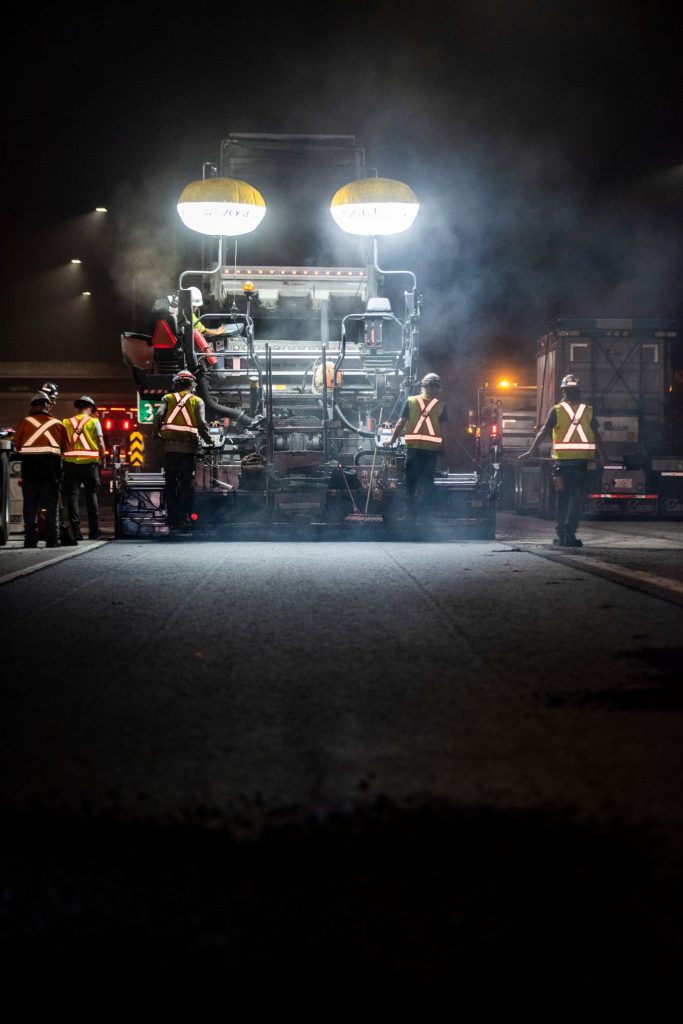
Remember when you’re paving at night that your work zone is only as big as your light source. Here the crew moves with the light and you can see the stark difference between light and dark working conditions. Use best reflective personal protective equipment and lights on your body when working at night, such as those you see on the All Roads Construction team members. Please visit the Safety Spotlight tab at www.theasphaltpro.com for additional safety tips.
“Another added value to that is you’re able to monitor that on the paver,” Spedding continued. “The foreman is able to keep tabs if rollers are falling behind. It was part of the whole train going as a concerted effort. The intelligent compaction had a vital role in putting down the amount of tonnage we were able to put down in that amount of time. Its value was quite evident for us, in getting us off the highway in time.”
Another unexpected bonus All Roads gained from the intelligent compaction technology is that it helps operators from a training perspective.
“It gives roller operators a better idea to know how many passes it really takes,” Spedding said. “It’s keeping everybody honest.”
“Four hundred tonnes an hour is not a typical production for us in the lower mainland with such a high volume of traffic, so when you do achieve it, the big concern is that the rollers aren’t able to keep up,” Labelle added. “To have the rollers know they achieved compaction and they don’t have to make an extra one or two passes to make sure it’s good, I think the intelligent compaction was vital.”
Strong Support for Productivity
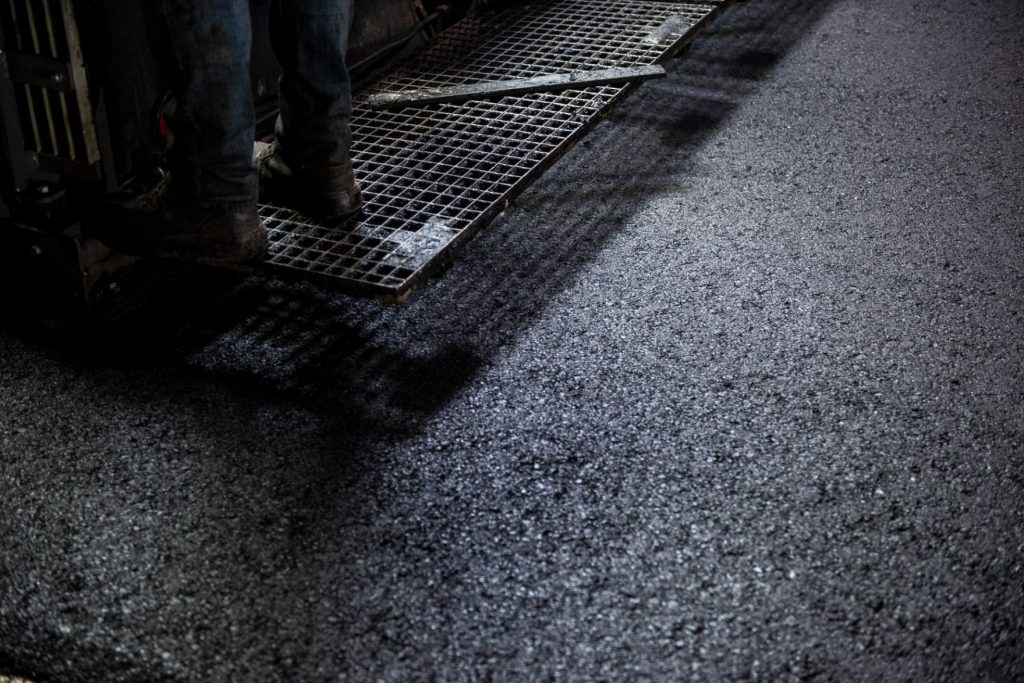
Even paving in excess of 385-440 tons an hour, the crew placed a gorgeous mat.
All Roads purchased its Wirtgen technologies from the local Brandt dealership near its head office. Labelle said the support they received from their dealer was impressive.
“We bought our Vögele and HAMM this year and the whole team was really good,” he said. “Especially at the beginning, coming out and helping us. We had calls talking about screeds, they advised us on why we should or shouldn’t do certain things…there was very good communication.”
One of the reasons All Roads invested in Wirtgen Group technologies was to minimize downtime on their equipment. Over the course of the Highway 1 project, they achieved that goal.
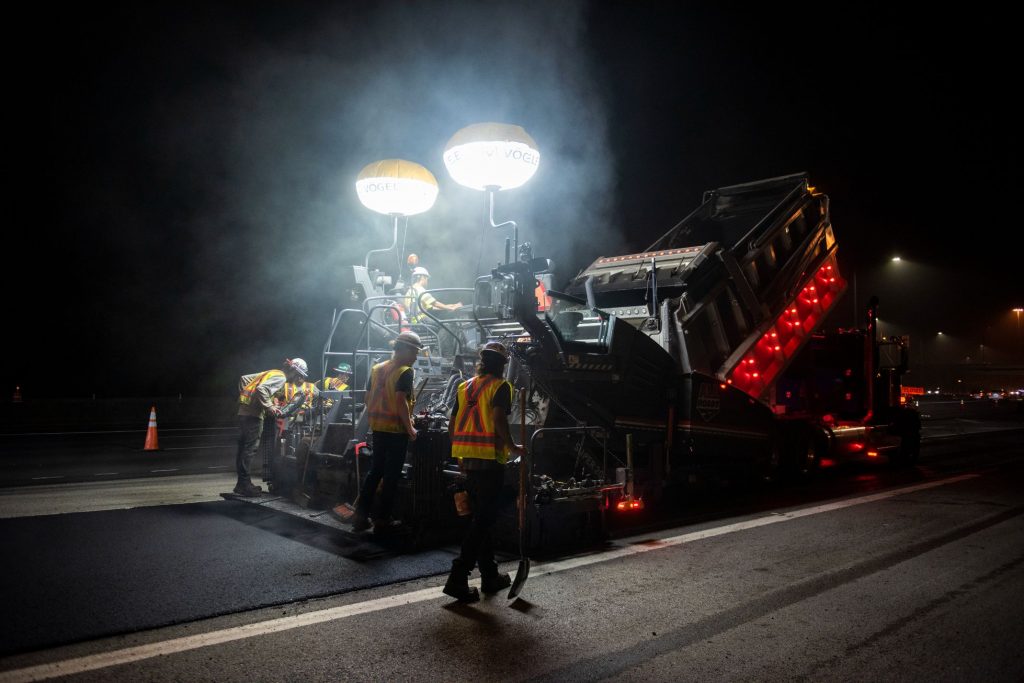
While the extensive lighting on the haul truck is impressive in this image, also notice the Smoothride road resurfacing solution bailer from Topcon Positioning Systems, Livermore, California, also has lights.
“We had no mechanical issues,” Labelle said. “There was 53,000 tonnes of asphalt put down and we had zero downtime.”
The Next Generation
Stephens said that having these types of technologies not only keeps the company ahead of the curve in terms of competitiveness, but they are also a big draw for attracting the next generation of talent to the construction sector.
“We have a very young group at All Roads, mid-thirties, if that,” Spedding said. “A lot of young guys are not afraid of these technologies. I’d say 95 percent of our employees were excited about them.”
“New millennials aren’t attracted to the shovel,” Stephens added, saying that if companies want to have workers 10 to 15 years from now, they will need to invest in technologies that draw young people’s attention.
Thanks to the hard work of the crews at All Roads and the incorporation of Wirtgen technologies, the team completed the high-profile Highway 1 project in September, a few weeks ahead of its October 2020 completion deadline.
“The Ministry didn’t receive any complaints over the tenure of the project,” Labelle reported. “I think it was a great success. People were going on our website complimenting us on the work. Our competitors never thought we would get the production we got. They said we would never get 800 tonnes [880 tons] of production per shift, but we doubled our production on average of what the industry standard would be. This is a big reason why we got finished ahead of schedule. If we didn’t have that Wirtgen equipment and that technology, we would probably still have 15,000 tonnes [16,500 tons] to put down…the Ministry is now a firm believer in the capability of the technologies and the equipment. It was an all-around success.”
